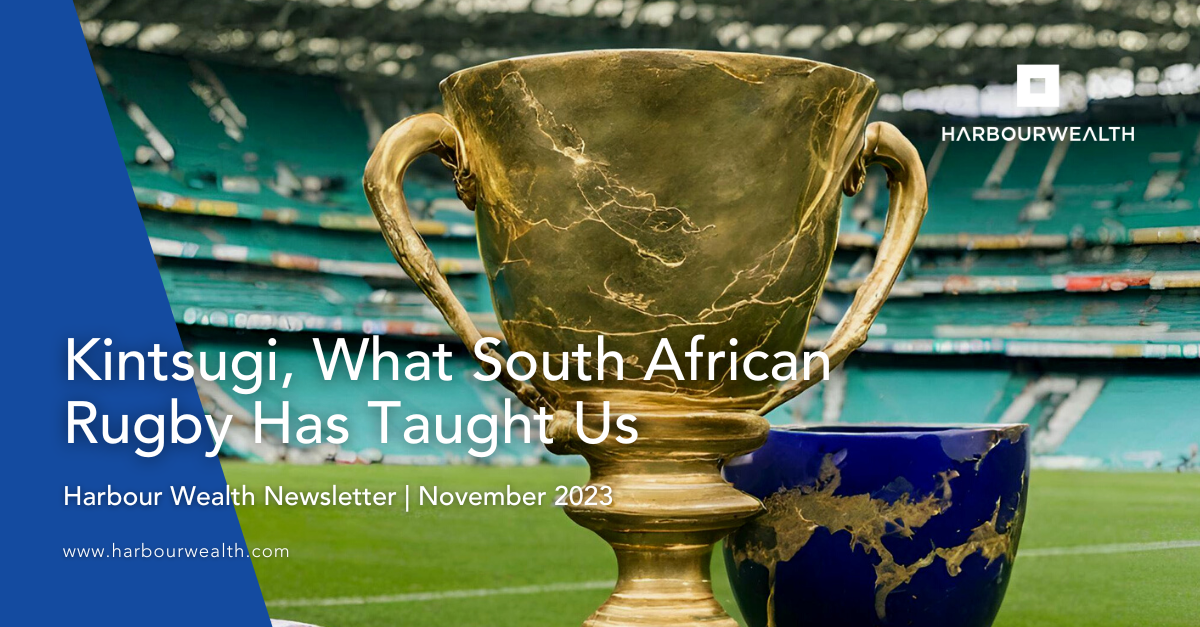This Japanese art of restoration is rooted in the belief that something broken can be restored into a stronger, more beautiful piece than the original.
Although I’m ashamed to admit it, I nearly placed a thousand rand bet on the Springboks losing to Japan in their opening game of the 2015 World Cup. The odds were supposedly a thousand to one, and on that day, anything seemed possible. After circling the Gonubie Hotel Tab twice, looking for parking, I eventually decided to leave the bet and head to a friend’s rugby braai. Three hours later I was stunned as Japan secured their first-ever win against South Africa, and my potential million-rand winnings vanished into thin air.
South African rugby was entangled in political interference, leading to issues of transformation and representation. The imposition of quotas and political pressure regarding team selection clouded the environment. I was one of the many consumed by pessimism that enveloped the nation at the time, at braai’s I would add my five cents worth, “Ja, 2007 was the last World Cup we’ll ever win; there’s too much politics in sport nowadays.” The confluence of these factors—unexpected losses, a crisis of confidence, and political entanglements—created an atmosphere of uncertainty and disillusionment within the South African rugby mad community.
But then, in walked Rassie and Siya and from the ashes, we rose.
The aftermath of the 2015 Rugby World Cup catalysed introspection, leading to reforms addressing the systemic issues plaguing the sport. South African rugby embarked on a journey of revitalisation, seeking to strike a balance between inclusivity and excellence, ensuring that the sport could thrive while reflecting the nation’s diversity.
Rassie and Siya led South Africa to a remarkable victory over England in Japan’s 2019 Rugby World Cup, beautifully documented in the film ‘Chasing the Sun.’ And more recently, the Springboks’ triumph in Paris which caused distress among many Northern Hemisphere (and some Kiwi) pundits who claim that an inferior rugby nation stole victory, which is absurd.
Kintsugi, to be restored and strengthened from being broken. Kintsugi, Rassie is a master of this craft.
What did Rassie and the coaching staff do that set the Springboks up for rugby greatness?
In my limited and humble rugby expertise, I pen our success down to five things: Experience, Research, Selection, Implementation and Faithfulness.
- Experience: Nothing changes without it. Steve Jobs didn’t suddenly arrive as a modern-day influencer; he had years of challenging experience that guided him to where he arrived, a ‘game-changer’. Experience serves as a formidable guide on the journey to success, acting as a compass that steers individuals through the complexities of life. Each encounter, triumph and setback, contributes to a reservoir of knowledge that becomes an invaluable resource. Rassie surrounded himself with the right balance of experienced players and staff who were able to offer their expertise to the young guns who brought with them fire and passion; this practice of ‘handing over the torch’ has been evident in the expounding depth of the Bok squad since the trough of 2015.
- Research: The time invested by the Springbok technical team in analysing statistics and game data is a critical component of their strategic approach to rugby. To have the edge in the highly competitive world of international rugby, meticulous analysis of performance metrics, player statistics and opposing teams’ gameplay is indispensable. By leveraging data-driven insights, the Springbok technical team enhanced their ability to adapt to dynamic situations on the field, ultimately leading to Siya raising the cup in two back-to-back World Cups.
- Selection: Rassie ensured that each player, irrespective of race, earned their place on the team based on merit. He motivated each player to give their best, and they played not just for victory but for each other and their country.
- Implementation: Considering strengths and weaknesses at team and individual levels, statistical analysis and conditions, the team ratifies and implements a game plan to the best of their ability on game day. Rassie and Jacque earned rare praise from adversary Clive Woodward after we snuck past England in the Semi-Finals in France. Clive applauded the coaches for having the courage to make significant changes to the team and game plan midway, which ultimately saw victory clinched by the Boks. The takeaway from this is, don’t be afraid to make a big call if you are sinking or a rare opportunity is within reach.
- Faithfulness: Our rugby public is impatient, calling for substitutions prematurely and agonising when players seemingly off form, are re-deployed to the battlefield. Rassie and his team have demonstrated the importance of loyalty and faithfulness in achieving success. A great example of this was coach Nienaber’s continued support of Manie Libbok, who seemed to be battling with his kicking. Manie was instrumental in getting us to the final; his fieldwork and reading of the game versus France, regarded as possibly the greatest test of all time, echo on in the halls of rugby greatness.
After our great victory against the All Blacks in Paris, I took time to reflect on my financial journey, which has been dotted with setbacks, as I’m sure many of you can relate. Can we borrow anything from the Springbok success story and apply it to our journeys?
As individuals, we are the captains responsible for navigating our journeys.
We all have relevant experiences, and it’s essential to correctly process and learn from them to make better decisions in the future. At some point, we all have made poor financial decisions, suffered from setbacks and have been forced back to the drawing board. However, these setbacks are not just random events. Instead, they are lessons that can guide us back to the path of success. What else do we need?
Critical to success is a coach, a financial guide who knows the game well, someone trustworthy and committed to our success, without fear or favour.
This is the most essential key to success and the easiest to get wrong. The right coach will facilitate the selection of appropriate componentry; in our world, this refers to optimal and maintained asset allocation, investment horizons, risk management, maximising tax and cost efficiencies and product selection. The margin for error is so slight that navigating the complex world of advice is like walking a tightrope; every step must be calculated with precision, as the consequences of a misstep can be significant and unforgiving, particularly in the latter stages of the journey. Once a battle chest of appropriate weaponry is acquired, a winning strategy or game plan can be implemented. This is a dynamic process; if necessary, the right coach will have the courage to siren big calls in the heat of battle.
To win, the final ingredient that is required from us, the captains of our journeys, is faithfulness.
No great victory was easily won; at times, the path was shadowed with doubt and fear, yet the great victories were won when the players remained faithful to the process, until the final whistle was blown. The underdogs have notched the greatest of victories recorded, those that have returned from being broken and written off. This is the timeless art of Kintsugi.



